 Petzlover
Petzlover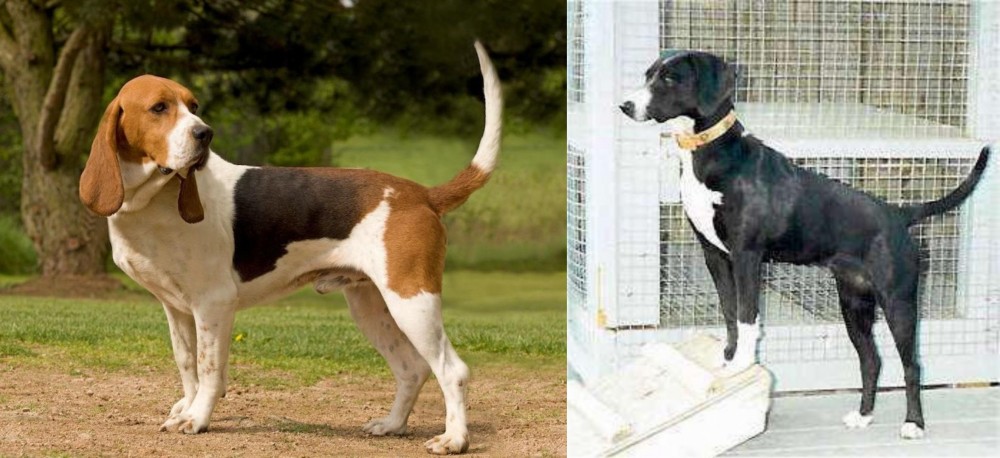 Artois Hound is originated from France but Stephens Stock is originated from United States. Artois Hound may grow 9 cm / 4 inches higher than Stephens Stock. Artois Hound may weigh 28 kg / 61 pounds lesser than Stephens Stock. Both Artois Hound and Stephens Stock has almost same life span. Artois Hound may have more litter size than Stephens Stock. Both Artois Hound and Stephens Stock requires Low Maintenance.
Artois Hound is originated from France but Stephens Stock is originated from United States. Artois Hound may grow 9 cm / 4 inches higher than Stephens Stock. Artois Hound may weigh 28 kg / 61 pounds lesser than Stephens Stock. Both Artois Hound and Stephens Stock has almost same life span. Artois Hound may have more litter size than Stephens Stock. Both Artois Hound and Stephens Stock requires Low Maintenance.
 The Artois Hound developed in France, essentially from the Picardy and Artois regions of northern France. The idea was to use them for the hunting of hares, fox and wild boars during the time of King Henry IV and Louis XIII. Unfortunately, with cross-breeding, the bloodline all but deteriorated and it took a couple of decades for the Artois breed to be restored.
The Artois Hound developed in France, essentially from the Picardy and Artois regions of northern France. The idea was to use them for the hunting of hares, fox and wild boars during the time of King Henry IV and Louis XIII. Unfortunately, with cross-breeding, the bloodline all but deteriorated and it took a couple of decades for the Artois breed to be restored.
After the 2nd world war, there was once again concern about the breed becoming extinct. A certain Mr.Audréchy from northern France stepped in and the breed was built up again. Today this hunting dog is essentially found in France, and a few hundred of them are registered with the Federation Cynologique Internationale (FCI), and both the FCI and the United Kennel Club (UKC) recognize the Artois Hound.
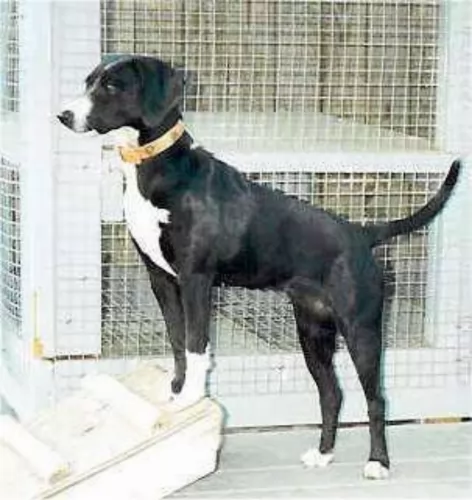 The Stephens Stock is a member if the Cur dog breeds. They are a scent hound bred in southeastern Kentucky by the Stephen’s family. For generations the dogs were simply known as the “little black dog”. The Cur breeds are dogs with a mixture of ancestry and the Stephens Cur is no different. However, the name Cur now means a working dog from the South in the United States. They were known as hunting and guard dogs, chasing wild boar, squirrel and raccoon. They were also called the Mountain Curs throughout Kentucky, Tennessee and Virginia.
The Stephens Stock is a member if the Cur dog breeds. They are a scent hound bred in southeastern Kentucky by the Stephen’s family. For generations the dogs were simply known as the “little black dog”. The Cur breeds are dogs with a mixture of ancestry and the Stephens Cur is no different. However, the name Cur now means a working dog from the South in the United States. They were known as hunting and guard dogs, chasing wild boar, squirrel and raccoon. They were also called the Mountain Curs throughout Kentucky, Tennessee and Virginia.
These mountain working dogs came close to extinction by the 1940’s but four separate breeders set out to save the Mountain Curs. They were the founders of the Mountain Cur Club and involved Woody Huntsman of Kentucky, Carl McConnel of Virginia, Dewey Ledbetter of Virginia and of course Hugh Stephens of Kentucky. Later the name of the club was changed to the Original Mountain Cur Breeders Association or OMCBA. The Mountain View Cur, the Treeing Cur and the Stephens Stock Cur were the results of their efforts.
In the 1970’s Stephen’s decided that his Cur was different from the original Mountain Curs and should be a separate breed. He formed the Stephen’s Breeders Association and the breed was recognized as distinct from other Curs. However, it was not recognized by the UKC (United Kennel Club) until 1998.
 Looking much like the Basset Hound and also referred to as French Artois Hound, Picard or Briquet, the muscled Artois Hound is a descendant of the Bloodhound and a rare breed.
Looking much like the Basset Hound and also referred to as French Artois Hound, Picard or Briquet, the muscled Artois Hound is a descendant of the Bloodhound and a rare breed.
The dog is well built with a large head, large eyes and large, hanging ears. He has a short coat, with the main colours being white, tan and black.
The energetic Artois Hound is a medium-to-large sized dog breed, and by FCI standard, they should be 20 inches to 22 3/4 inches tall from ground to withers.They weigh between 25 – 30kg or 55 and 65 pounds, are well muscled and strong with a short, dense coat.
These dogs are known for their endurance, making them ideal as a hunting- or walking companion. The Artois Hound is full of energy and he will require plenty of boisterous activities as well as training and socialization.
Although this is an intelligent breed, he can be stubborn. He’s a friendly character and will get on well with children, loving their energy and games. He’s amicable, and will also get on with other pets in the home too.
Artois Hounds are loyal to their human families. They’re not particularly good watchdogs though as they aren’t aggressive dogs, being social and friendly.
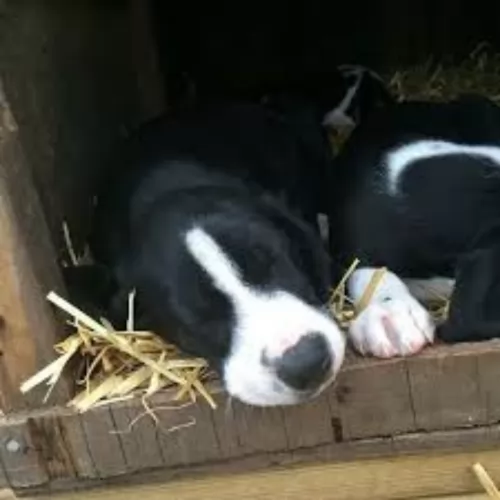 The Stephens Stock Cur is a breed of medium size, dark dogs – either very dark grey or black. Their heads are domed, and the muzzle is short with dark eyes. The breed’s chest is broad and deep with a neck of medium length and either a rough or smooth coat. They are smaller than the other Curs like the Black Mouth Cur or the Mountain View Cur.
The Stephens Stock Cur is a breed of medium size, dark dogs – either very dark grey or black. Their heads are domed, and the muzzle is short with dark eyes. The breed’s chest is broad and deep with a neck of medium length and either a rough or smooth coat. They are smaller than the other Curs like the Black Mouth Cur or the Mountain View Cur.
They are strong and capable of treeing their prey. Their body is longer than it is high, and they have powerful and long legs. Their appearance is sleek and elegant. The nose is dark and square, and their stance is alert and that of a watchdog. This is an athletic hunting dog that is aggressive in the field and chilled at home.
 Your Artois is an ideal family pet when you provide him with the love and attention that any member of a family deserves. Buy your Artois from a reputable breeder so that all the excellent characteristics of this lively breed are found in your 4-legged friend.
Your Artois is an ideal family pet when you provide him with the love and attention that any member of a family deserves. Buy your Artois from a reputable breeder so that all the excellent characteristics of this lively breed are found in your 4-legged friend.
The Artois is just waiting to be your devoted companion and will promise unconditional friendship in exchange for quality food, veterinary care, exercise and attention. To make sure you never lose your pet, outfit him with a collar and ID tag so that should he become lost, the chances are far better that he’ll be found.
A dog isn’t a human and you want to always make sure that you’re reasonable with what to expect from him. Most little problems with your wonderful friend can be solved with kindness, compassion and patience.
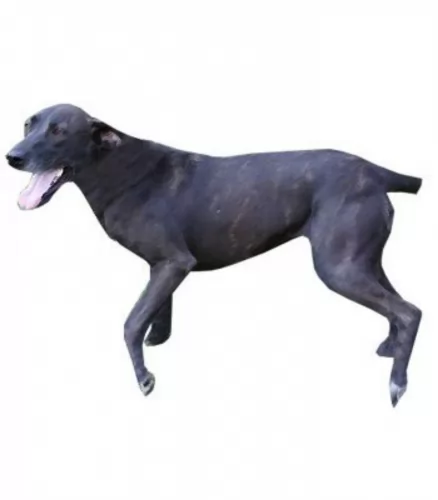 1. Children friendliness - They are tenacious on the hunt but once at home they love children.
1. Children friendliness - They are tenacious on the hunt but once at home they love children.
3.Adaptability They are adaptable if you can get them the exercise, they need every day. They won’t do well in an apartment without going to play and run somewhere else every day.
 There are no known health problems that come as specific to the Artois Hound. The health problems that do develop are common ailments that can be found in most other dog breeds too.
There are no known health problems that come as specific to the Artois Hound. The health problems that do develop are common ailments that can be found in most other dog breeds too.
Your Artois Hound will still need to visit the vet as a puppy for a thorough check-up as well as vaccinations and for any health issues he may have.
check for bad breath problems. Dental plaque can cause a nasty odour that will require dental treatment from a professional. The dog’s teeth can be maintained by brushing the teeth regularly with special canine toothpaste- and brush. However your dog’s bad breath could be indicative of other health problems such as diabetes.
Parasites, fleas, ticks and worms – there are many new treatments to manage these pests and your veterinarian will guide you towards a treatment for your pet.
if your pet is exposed to mosquitoes often, the insect carries the worm from dog to dog. Speak to your vet about treatment, more so when you live in a warm, wet area where mosquitoes thrive.
Your Artois Hound puppy will have to be vaccinated with a combo vaccine to protect him from hepatitis, distemper, leptospirosis, parvovirus and parainfluenza. They should have received their first immunizations by 8 weeks of age. Speak to your vet about rabies shots as well.
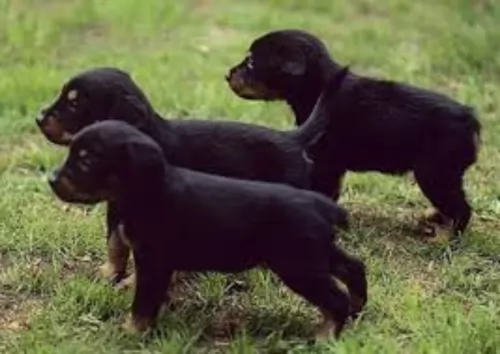 The Stephens Stock Cur is a fairly healthy breed, fairly isolated in the hills and mountains of Kentucky and Tennessee. They are prone to a few health conditions but there are no genetic and breed specific issues.
The Stephens Stock Cur is a fairly healthy breed, fairly isolated in the hills and mountains of Kentucky and Tennessee. They are prone to a few health conditions but there are no genetic and breed specific issues.
• Ear and Eye Infections. Keep them clean and keep debris out of both ears and eyes after hunting.
 The beauty with the Artois Hound is that he is low-maintenance and he will only require the basic tender loving care to keep him happy and healthy.
The beauty with the Artois Hound is that he is low-maintenance and he will only require the basic tender loving care to keep him happy and healthy.
The Artois isn’t a high maintenance dog and the low-shedding, short-haired coat will required a good brush a couple of times a week to remove loose hairs. The dog only requires a bath when absolutely necessary as bathing dries out natural oils in the skin. Never use a human shampoo – only a proper dog shampoo.
Artois Hound puppies up to 12 weeks will need to be fed every 6 hours. Puppies of 6 months and older can have 2 bowls of food, and from one year of age, one bowl of food may be adequate. It’s an individual choice as 2 smaller meals a day can also suffice. Speak to your vet about premium-quality dry- and wet foods as well as about making your own dog food. You want to ensure the foods eliminate mineral and vitamin deficiencies. Ensure there is ALWAYS a bowl of fresh, cool water within your dog’s reach.
This is a hunting dog so he will need plenty of exercise. Without regular exercise, a dog like the Artois becomes frustrated and destructive. Your Artois is your 4-legged family member, and according to age and individual traits will benefit from throwing ball games, pulling on ropes and running while you cycle. The cherry on the top is that you benefit from the exercise too!
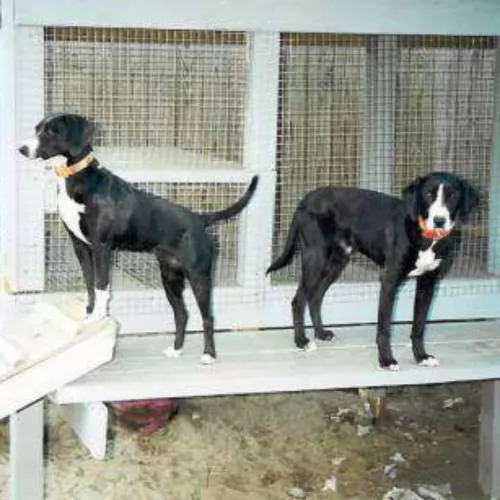 1.Feeding the puppy -Feed puppies a quality food desired for medium breed, high energy dogs. Puppies should eat 3 times a day about a total of 2 cups.
1.Feeding the puppy -Feed puppies a quality food desired for medium breed, high energy dogs. Puppies should eat 3 times a day about a total of 2 cups.
2.Feeding the adult Feed a high quality dog food with plenty of protein and designed for medium size dogs. Feed a total of 3 cups over 2 meals a day.
4. Games and Exercises – This is a very high energy treeing hunting dog with remarkable speed and agility. They need exercise – both physical and mental. One walk a day will not do it for these dogs. Have a fenced in yard or take them to organized activities like field trials, agility, flyball, hunting, search and rescue or barn hunt. They love to hunt with their people.